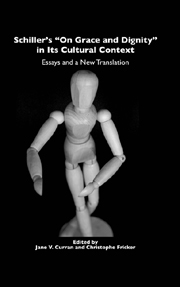Book contents
- Frontmatter
- Contents
- Acknowledgments
- Notes on References and List of Abbreviations
- Introduction
- The Cultural Context
- Schiller's Essay “Über Anmut und Würde” as Rhetorical Philosophy
- Schiller as Citizen of His Time
- Sensuous-Objective: Beauty in the Realm of Human Freedom: On the Language of Concepts in Schiller's Essay “On Grace and Dignity”
- From Romantic Dream to Idyllic Tragedy: Idealism and Realism in Schiller's Dramas, Before and After Kant
- The Poet as Herald of Grace and Dignity: The Influence of Schiller's Twin Concepts on Stefan George
- The Text
- Notes on the Contributors
- Index
Schiller as Citizen of His Time
from The Cultural Context
Published online by Cambridge University Press: 05 February 2013
- Frontmatter
- Contents
- Acknowledgments
- Notes on References and List of Abbreviations
- Introduction
- The Cultural Context
- Schiller's Essay “Über Anmut und Würde” as Rhetorical Philosophy
- Schiller as Citizen of His Time
- Sensuous-Objective: Beauty in the Realm of Human Freedom: On the Language of Concepts in Schiller's Essay “On Grace and Dignity”
- From Romantic Dream to Idyllic Tragedy: Idealism and Realism in Schiller's Dramas, Before and After Kant
- The Poet as Herald of Grace and Dignity: The Influence of Schiller's Twin Concepts on Stefan George
- The Text
- Notes on the Contributors
- Index
Summary
While it would be hard to maintain that “Über Anmut und Würde” has much in the way of overt political content, the treatise was certainly written at a time of high political tension. In late 1792 and early 1793, Schiller had started drafting a theory of beauty in a series of letters to his friend Christian Gottfried Körner, while at the same time considering an intervention in the trial of King Louis XVI in Paris. It is unknown what precisely he was proposing to say, but it is certain that it would have included a plea to spare the King's life. The trial was arousing a high level of attention in Germany, with opinion shifting away from the sympathy that had originally been shown to the revolutionaries towards a disdain for their apparent descent into lawlessness. With Louis's life at stake, Schiller wrote to Körner on 21 December 1792 of a dual benefit that could result from his (Schiller's) intervention at this time. First, a statement by a prominent foreigner might make an impression on “diese richtungslosen Köpfe” (these disoriented minds). Second, however, Schiller speculated that such a statement might have a positive effect at home as well:
Außerdem ist gerade dieser Stoff sehr geschickt dazu, eine solche Vertheidigung der guten Sache zuzulassen, die keinem Mißbrauch ausgesetzt ist. Der Schriftsteller, der für die Sache des Königs öffentlich streitet, darf bei dieser Gelegenheit schon einige wichtige Wahrheiten mehr sagen, als ein anderer, und hat auch schon etwas mehr Credit. Vielleicht Räthst Du an mir zu schweigen, aber ich glaube, daß man bei solchen Anlässen nicht indolent und unthätig bleiben darf. Hätte jeder freigesinnte Kopf geschwiegen, so wäre nie ein Schritt zu unserer Verbesserung geschehen. Es giebt Zeiten, wo man öffentlich sprechen muß, weil Empfänglichkeit dafür da ist, und eine solche Zeit scheint mir die jetzige zu sein.
(NA 26:172)- Type
- Chapter
- Information
- Schiller's 'On Grace and Dignity' in its Cultural ContextEssays and a New Translation, pp. 37 - 54Publisher: Boydell & BrewerPrint publication year: 2005

